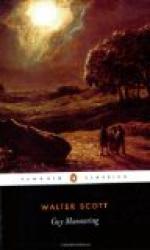A tribe of these itinerants, to whom Meg Merrilies appertained, had long been as stationary as their habits permitted in a glen upon the estate of Ellangowan. They had there erected a few huts, which they denominated their ‘city of refuge,’ and where, when not absent on excursions, they harboured unmolested, as the crows that roosted in the old ash-trees around them. They had been such long occupants that they were considered in some degree as proprietors of the wretched shealings which they inhabited. This protection they were said anciently to have repaid by service to the Laird in war, or more frequently, by infesting or plundering the lands of those neighbouring barons with whom he chanced to be at feud. Latterly their services were of a more pacific nature. The women spun mittens for the lady, and knitted boot-hose for the Laird, which were annually presented at Christmas with great form. The aged sibyls blessed the bridal bed of the Laird when he married, and the cradle of the heir when born. The men repaired her ladyship’s cracked china, and assisted the Laird in his sporting parties, wormed his dogs, and cut the ears of his terrier puppies. The children gathered nuts in the woods, and cranberries in the moss, and mushrooms on the pastures, for tribute to the Place. These acts of voluntary service, and acknowledgments of dependence, were rewarded by protection on some occasions, connivance on others, and broken victuals, ale, and brandy when circumstances called for a display of generosity; and this mutual intercourse of good offices, which had been carried on for at least two centuries, rendered the inhabitants of Derncleugh a kind of privileged retainers upon the estate of Ellangowan. ’The knaves’ were the Laird’s ‘exceeding good friends’; and he would have deemed himself very ill used if his countenance could not now and then have borne them out against the law of the country and the local magistrate. But this friendly union was soon to be dissolved.
The community of Derncleugh, who cared for no rogues but their own, were wholly without alarm at the severity of the Justice’s proceedings towards other itinerants. They had no doubt that he determined to suffer no mendicants or strollers in the country but what resided on his own property, and practised their trade by his immediate permission, implied or expressed. Nor was Mr. Bertram in a hurry to exert his newly-acquired authority at the expense of these old settlers. But he was driven on by circumstances.




